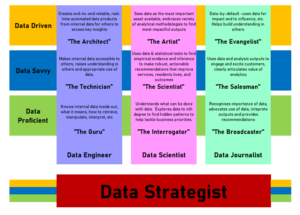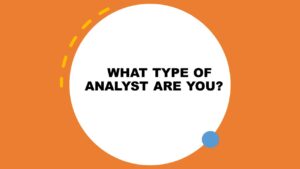What type of analyst are you?
Stephen Simpkin, Data Science Fellow, Essex County Council is redefining the term analyst...
Analyst is a much over-used word, especially in job titles. It's often used as a catch-all term for anyone that does anything with any data. It's not particularly descriptive or informative.
For an organisation this can sometimes make it tough to attract the right type of analyst, or determine how best to develop your existing analysts.
For an analyst it can be difficult to stand out when you share a job title with literally hundreds of thousands of people in the UK (in 2018 there were 120,000 analyst job listings!). And how does 'an analyst' filter through all the available material and resource to ensure they are moving in the right direction and learning the right skills for their profession? What is useful for a finance analyst is not necessarily what is required for a performance analyst (for example).
I appreciate the irony of saying the word analyst is over-used, and then using the word EIGHT times already (count them) – but if someone at a party told me “I’m an analyst” I would have no idea what they do. They may as well say “I’m a person with a face” as that is equally informative.
I am attempting to rid the world of the word analyst! Or probably more accurately, I want to expand the definition - creating different professional profiles for different analytical skillsets.
The below is purely for analysts in the data science, social science, modern business intelligence space (or anything that goes hand-in-hand with those disciplines). I’ve focussed on three key professions important for impactful analytics:
- Data Engineer
- Data Scientist
- Data Journalist
*for any pedants that want to obsess over exact terminology of these things, call the roles whatever you like – the main separation I am trying to make is between the skillsets.

For each of these professions, I have attempted a summary of the type of person, their responsibilities, and their strengths across three levels of organisational data maturity (from CIO data maturity framework).
This is key to us at ecda, as this is what helps us in our aim to develop and build capabilities across our network of analysts that exist in the county.
If you identify as an ‘Interrogator’ but want to take that step to become a ‘Scientist’ we have a range of support material and training that can assist you.
If you are a ‘Guru’ keen to progress to a ‘Technician’, we have connected people from different organisations to make that step together.
If you are an ‘Evangelist’ …. well, we want to hear from you to see how you influence with data!
You may be an analyst that identifies with one of these profiles, or you may have an interest in analytics but are not sure what profession pathway is for you – in either case, click here to take my short quiz and find out “What type of analyst are you?”

